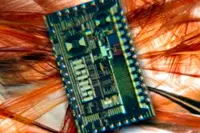 Building on its expertise in developing RF transceivers for medical applications, Microsemi has unveiled a low power sub GHz transceiver for industrial systems. According to the company, the ZL70550 brings ‘best in class’ low power characteristics, a high level of integration and an extremely small footprint.
Building on its expertise in developing RF transceivers for medical applications, Microsemi has unveiled a low power sub GHz transceiver for industrial systems. According to the company, the ZL70550 brings ‘best in class’ low power characteristics, a high level of integration and an extremely small footprint.
Francois Pelletier, product line director, said the company’s medical devices had been developed to use the MICS band, which spans 402 to 405MHz. “Devices using this band can’t be used for anything but implantable technology, so we’ve developed a chip for industrial applications with the same features.”
Operating in ISM bands ranging from 779 to 965MHz and with a range of up to 200m, the ZL70550 consumes 2.8mA while transmitting at -10dBm and consumes 2.5 mA during reception. A sleep current of 10nA is said to suit it to low duty cycle applications.
The ZL70550 operates from a supply ranging from 1.7 to 3.6V and supports variable output power and data rates up to 200kbit/s. For those applications requiring extended range, output power, input sensitivity and data rate can be adjusted to give a link budget up to -107dBm.
“By leveraging the same intellectual property,” Pelletier added, “we have successfully developed for implantable pacemakers and hearing aids where power consumption cannot be compromised, we are able to provide the lowest power wireless link in a small form factor that is easy to deploy.”
The ZL70550 is available in a 3 x 2 mm chip scale package or in 5 x 5mm QFN. Microsemi notes that, other than an antenna and, in some cases, its matching network, only a crystal, resistor and two coupling capacitors are required.
Author
Graham Pitcher
Source: www.newelectronics.co.uk
